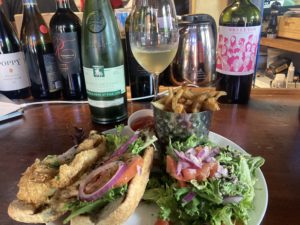National Culinary Arts Month in July recognizes the professional cooks and chefs who bring innovative, and unique cuisine from their kitchens to our tables. Green Energy Biofuel will talk with some of our great chefs to bring attention to their unique styles and environmental focus.
By Taylor Strickland, 07/07/2020
Manuel’s Bread Café, North Augusta SC
Manuel’s Bread Café is located in North Augusta, SC, in the upscale neighborhood of Hammonds Ferry. The titular chef and owner is French Chef Manuel Verney-Carron. Chef Manuel grew up in the South of France and studied hotel/restaurant management in Grenoble. Speaking little English at the time, Chef Manuel immigrated to the USA and got a job at La Masion in Augusta, GA. There, he met his now-wife Sophia, daughter of the owner, Chef Heinz Sowinski. Chef Manuel and Sophia traveled the USA, while he worked in Lake Placid, Tennessee, and an exclusive resort in the Florida Keys. Returning to Augusta to La Masion, Chef Manuel built a woodfire stove to bake bread, selling it wholesale to restaurants and markets. In 2008, he opened Manuel’s Bread Café, specializing in a hybrid of French and American cuisine. After attracting a lot of attention, Chef Manuel opened a second restaurant, The Larder, offering more tapas and bistro dishes.
Q: What is your philosophy of cooking?
A: I think back to memories of my mother and grandmother cooking classically in the South of France. I was able to memorize all those wonderful flavors. It’s hard to find the exact same ingredients here, but I try to recreate their cooking while adding my own American twist.
Q: What is your favorite food to fry?
A: That’s a difficult question to answer. We do serve an old-fashioned French fry. The potatoes are peeled, cut, then soaked in water. We fry them at a low temp, then drain the oil. When ordered, we drop them in a fryer a second time at high temp, which creates a crust on the fry, but a soft-cooked center.
Q: What types of cooking oils do you use and why?
A: I use rice bran oil for deep frying. The high smoke point cooks while not allowing the food to absorb the oil. Duck fat is nice to confit foods. We rinse off sauerkraut and slow cook it in duck fat, to take out the sharpness and create a creaminess for our Rueben sandwiches. Olive oil is perfect for sautéing, cooking also at a high temp, but adding a distinctly Mediterranean flavor.
Q: Why is recycling used cooking oil important to you?
A: We religiously change our cooking oil weekly, and with two restaurants, that ends up being a lot of oil. Being a farm to table business, I want to know the oil is used for something rather than thrown away.
Our Experience:
Chef Manuel prepared a cornmeal-crusted,  catfish filet sandwich, with a homemade tartar sauce containing bits of cornichon, and garnished with lettuce, tomato, and onion, on a whole grain hoagie bun. It was cooked to perfection. The catfish was moist, light, and the oil and cornmeal created an exterior that was flaky but not greasy. The tartar sauce was creamy with a nice dill flavor coming from the cornichon. It was served with his French fries, and a house salad dressed in a mustard vinaigrette. The fries were exactly as Chef Manuel described, having a firm crust with a soft center, without a trace of sogginess. The mustard vinaigrette from the salad added a flavor that lent itself to the catfish and fries, tying the whole meal together. A glass of Picpol de Pinet white wine was served, which was light, grassy, and crisp. The whole meal was all I needed for outside dining on a sunny afternoon at Manuel’s Bread Café.
catfish filet sandwich, with a homemade tartar sauce containing bits of cornichon, and garnished with lettuce, tomato, and onion, on a whole grain hoagie bun. It was cooked to perfection. The catfish was moist, light, and the oil and cornmeal created an exterior that was flaky but not greasy. The tartar sauce was creamy with a nice dill flavor coming from the cornichon. It was served with his French fries, and a house salad dressed in a mustard vinaigrette. The fries were exactly as Chef Manuel described, having a firm crust with a soft center, without a trace of sogginess. The mustard vinaigrette from the salad added a flavor that lent itself to the catfish and fries, tying the whole meal together. A glass of Picpol de Pinet white wine was served, which was light, grassy, and crisp. The whole meal was all I needed for outside dining on a sunny afternoon at Manuel’s Bread Café.
Manuel’S Bread Café
505 Railroad Ave #100
North Augusta, SC 29841
803-380-1323
